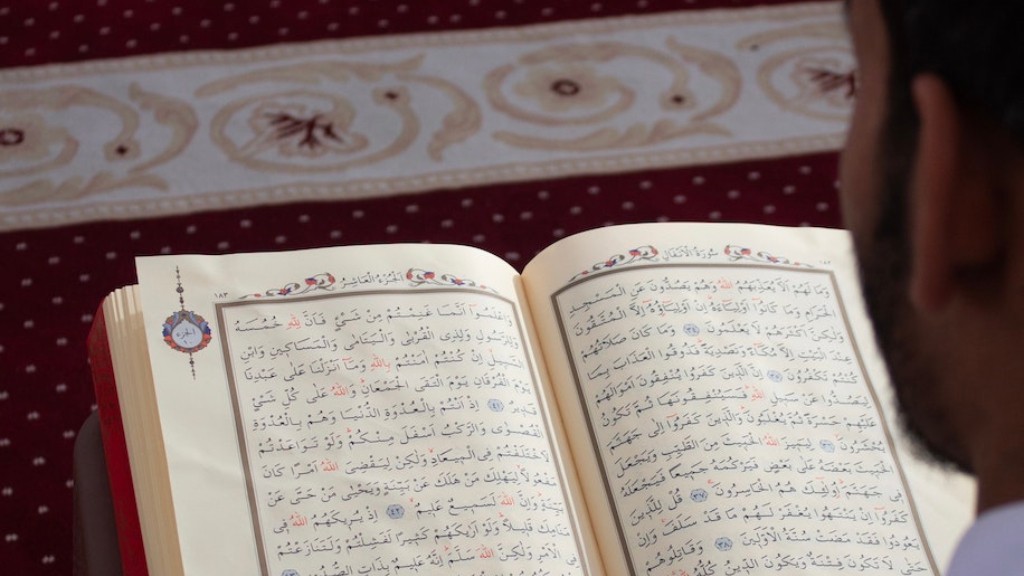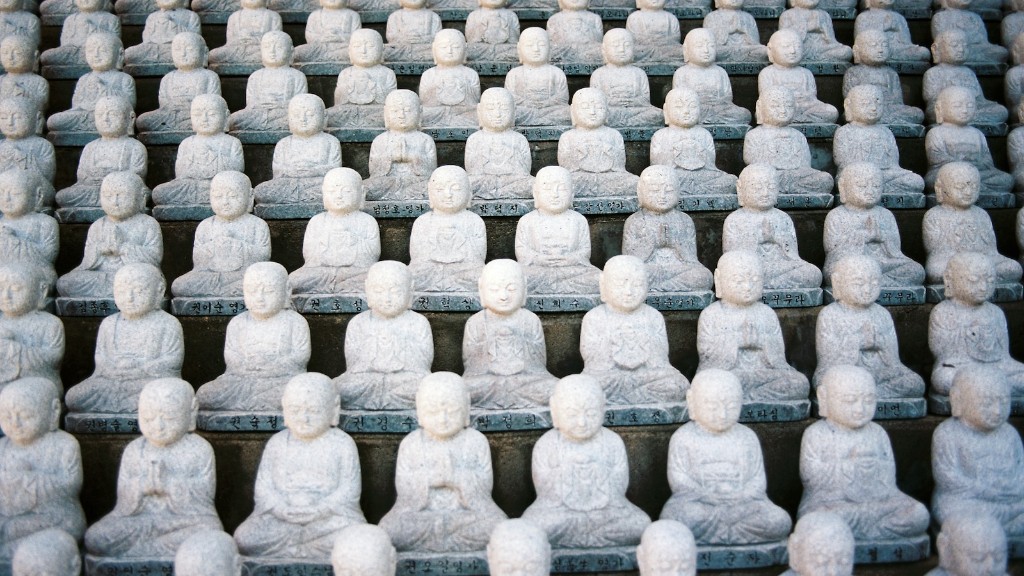Does Hinduism Believe in Creation?
Hinduism is an ancient religion that has numerous deities and complex beliefs and doctrines. The concept of creation, however, is one of the most essential tenants in Hinduism. Hindus believe that the creation was brought forth from the unbounded Brahman, the Supreme Being, when his possibilities were actualized. Creation is said to be a continuous process with each cycle of existence being born from and destroyed by the Supreme Being.
Hindu scriptures, especially the Vedas, are some of the oldest documents in human history. They contain tales of the gods and goddesses, as well as stories and wisdom about the creation. The Vedas explain that there was an infinite, boundless vacuum before the universe came into existence. This vacuum was filled with the potential of the Brahman, or the Supreme Being, and became a churning force that brought forth the universe.
Hindus vastly differ in their interpretation of creation. Some of the most popular beliefs include: creation by the gods, creation through continuous cycles of existence, or the big bang theory. According to the Vedas, the gods Indra, Prajapati, Vishnu, and Shiva are responsible for manifesting the entire universe. On the other hand, some believe that the universe is in a perpetual cycle of being created and destroyed in a cosmic rhythm. Lastly, there is also the belief that creation is the result of the big bang. This idea is closely related to the scientific explanation of how the universe began.
Hindu scriptures also place great emphasis on the role of karma. As individuals, humans have the power to create and attract the karma that is most beneficial for them. By consciously reflecting on their actions and behavior, individuals can take responsibility for their actions and their destiny. According to Hindu belief, karma is both the cause and the effects of our actions and serves as a form of cosmic justice.
Hinduism also places importance on dharma, or living a moral and righteous life. Dharma is all about right action, moral justice and determination. It is based on a hierarchy of Vedic laws and helps provide the Hindu doctrine with a sense of order and discipline. In order to find and maintain balance in life, it is important to live in accordance with the dharma.
Additionally, the concept of moksha or liberation is deeply embedded in Hindu belief. Hindus strive to detach themselves from the material world and reach higher states of consciousness. This is seen as the ultimate goal of life, and achieving it leads to ultimate freedom and peace. Hindus believe in reincarnation and each life is seen as an opportunity to work towards liberation and living a moral life.
Evolution of Hinduism
Hinduism has evolved and changed over time, responding to the changing needs and challenges of society. Early Hindu scriptures and beliefs focus mainly on attaining liberation and spiritual evolution. The Hindu beliefs of karma, dharma and moksha, which still remain today, were established during the Vedic period from 1500-500 BCE. Over the years, Hinduism has become the highly diverse religion that we know today; incorporating a variety of gods, beliefs and cultural practices.
The Hindu epics Ramayana and Mahabharata, composed between 450 BCE -200 CE, also greatly influenced the religion. They tell tales of heroes, gods and demons and provide guidance for Hindu followers. Many of the gods and goddesses, such as Vishnu and other Devi forms, are portrayed in these epics and have greatly influenced modern-day Hinduism. The Upanishads, a collection of philosophical texts composed in the Vedic period, have had a major impact on modern Hindu thought. Through these, Hinduism was further refined and developed in the years that followed.
The Bhakti movement, a devotional type of Hindu worship, had a decisive impact on the evolution of Hinduism in the Medieval period, from 500 – 1500 CE. This movement placed an emphasis on spiritual devotion and an emotional connection with the gods and goddesses. This was also the time when Hinduism spread to Southeast Asia, and was greatly influenced by Buddhist and Jain beliefs.
As we can see, Hinduism has changed and adapted through the centuries, responding to changing needs and beliefs. Yet, its core concepts of karma, dharma and moksha remain unchanged.
Interpretation of Hinduism by Scholars
Experts from various disciplines have studied and analyzed Hinduism over the years. According to Max Muller, a German Indologist and linguist, Hinduism is “the product of a quest for wisdom among the ancient Aryans”. He notes that it is a complex set of beliefs, doctrines, and rituals and has a unique ability to adapt and evolve with time. Other scholars, such as R.C. Zaehner, point out the polytheistic nature of Hinduism, incorporating the worship of numerous gods and goddesses.
Critics of the religion, such as British author Wendy Doniger, are of the opinion that Hinduism is not a structured religion and is “loosely structured around core values and concepts”. According to her, it is impossible to formulate specific dogmas or doctrines due to the strongly multicultural history of the religion. Philip Goldberg, another critic and scholar of Hinduism, has pointed out that Hindus have traditionally placed greater emphasis on stories, metaphors and parables. This, he believes, has allowed Hinduism to be more flexible in its interpretation and application.
The work of these scholars has been pivotal in showing how Hinduism has evolved over time and how it has been interpreted by different schools of thought.
Practices of Hindus
Hindus all over the world practice various rituals and festive celebrations. Some of the most distinguishing Hindu practices include puja, a ritualistic form of worship that involves offering material goods and spiritual devotion to the gods and goddesses. Hindus also follow a vegetarian diet and practice fasting on special occasions. Cremation is the most common type of funeral in Hinduism and is believed to be the most conducive to the journey of the soul towards liberation.
In Hindu societies, pilgrimage is an important part of the culture. Hindus visit temples and holy places, either individually or in groups, to seek blessings from the gods and goddesses. These pilgrimages are believed to bring physical and spiritual healing. Hindus also engage in social works such as alleviating poverty, helping the less fortunate and protecting the environment.
Texts Revered by Hindus
Hindus believe that the Vedas, Upanishads and Bhagavad Gita are the most sacred texts of Hinduism. The Vedas contain hymns, incantations and rituals devoted to the gods and goddesses. The Upanishads are philosophical texts and provide teachings on Vedic doctrines and how to attain liberation. The Bhagavad Gita is an epic poem composed as part of the Mahabharata and deals with the struggles and decisions faced by Krishna, a Sanskrit deity. It touches on topics such as fate and free will, the importance of action, and the power of devotion.
In addition to these texts, there are numerous other sacred scriptures and books that Hindus revere. These include the Agama Shastras, which are tantric texts devoted to goddess worship, the Dharma Shastra, which contains rules and regulations for Dharma, and the Puranas, which are vast collections of ancient stories. Other popular documents include the Ramayana and Mahabharata, which are collections of ancient folk tales.
From these texts, we can see just how varied and vast Hinduism is. It is a complex set of beliefs and practices, rooted in the ancient Vedas and Upanishads. Hindus have a deep reverence and respect for the Sacred Texts, which shape their practices and beliefs.
Comparison Between Hinduism and Other Religion
Hinduism is widely considered to be the oldest religion in the world, with many of its beliefs and customs dating back centuries. Over time, Hinduism has been compared and contrasted with other major world religions. Some scholars have compared Hinduism to Buddhism, noting the shared beliefs in karma and reincarnation. Others have drawn similarities between Hindu gods and goddesses and those of other cultures, such as the Greco-Roman pantheon.
When compared to other major religious traditions such as Christianity and Islam, one of the most important differences is that Hinduism does not have a single founder or prophet. In addition, Hinduism does not follow a strict set of laws or doctrines; rather, it is a collection of beliefs and practices that are open to interpretation. Furthermore, the religious texts of Hinduism are much more vast and varied than other religions, as there is no single book or document that is revered by all Hindus.
The history and origins of Hinduism are often debated, making it difficult to pinpoint when exactly it was established. Yet, its vast and complex nature, combined with its ability to evolve and adapt, has enabled it to remain relevant and influential throughout history.
Final Thoughts
It is clear that Hinduism is one of the oldest and most complex religions in the world. Hindus believe in a continuous cycle of creation and destruction and have a deep reverence for karma and dharma. The Sacred Texts of Hinduism, such as the Vedas, provide us with insight and wisdom on how to live our lives. Modern-day Hinduism has been heavily influenced by the work of scholars, who have studied and analyzed the religion for centuries.
Local Hindu communities provide an important sense of belonging and connection for Hindus, embodying the core values of the religion and allowing for different customs and rituals to survive and be celebrated. Overall, Hinduism is an ancient and mysterious religion that has stood the test of time and continues to influence the world.


